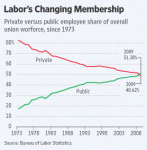- Joined
- May 22, 2011
- Messages
- 10,825
- Reaction score
- 3,348
- Gender
- Male
- Political Leaning
- Centrist
Thank you for covering everything I would have said. I have nothing to add, except that destroying unions is/was the objective of these laws and court rulings. Those (owners of corporations) that push these laws do so knowing that making dues voluntary makes unions weak and their own power greater. It's a feature not a bug.
This particular issue has very little to do with corporations in any direct sense whatsoever, since it dealt exclusively with the wages of public sector workers, not corporations. In a very indirect sense, any corporate support of Janus would have ostensibly been with an indirect goal of weakening the financial support to Democrats from public sector unions. But that is getting very tangential to the legal issue at hand.
Whatever the alleged or assumed "objective to destroy unions," the fact of the matter is that compulsory agency fees from public sector workers is an unconstitutional forced subsidy of political speech, and now employers are not allowed to presume employees want their money withheld and sent to unions, the way they previously could presume based on the way union security clauses would cause them to be fired if they don't. The Supreme Court directed employers to obtain clear and freely given consent from employees that they indeed wish to continue withholding money and sending it to the union. But when employers try to obtain this consent, the union sues them and insists employers keep withholding money from employees and sending it to the union, based on "consent" they gave when they were told they'd be fired for not agreeing (which is now illegal).

